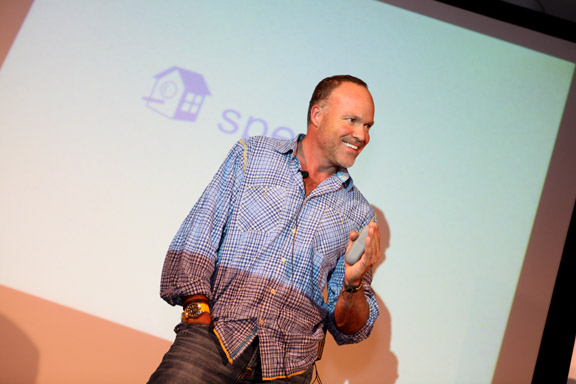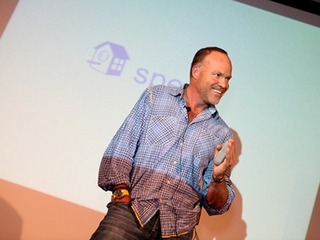
Following the first of several beer giveaways (see what you’re missing?), Brian Sharples, the tall and tanned CEO of the newly public HomeAway, took the stage at Vator Splash to talk entrepreneurship.
Sharples has been an entrepreneur most of his life, he said. It all starts with an idea. The best startups are created to solve a problem that entrepreneurs experience themselves.
“My first business was a total disaster,” he admitted. “We borrowed money and got this old boat and made this floating oyster and clam bar that also served beer and wine. Everything went well until we sold some bad clams to Walter Kronkite. He turned us in ’cause what we were doing was totally illegal.”
His next endeavor was to create a car-meet event. He raised $1 million, brought out tents and stages, and then…a freak mini-tornado literally leveled the event. Towers crashed down on people’s cars, the event was demoed.
“I lost a million bucks in three hours,” said Sharples.
But it takes more than just an idea. A good idea is nothing without good execution. “All the failures I had is what made HomeAway successful,” said Sharples. “I love to invest in people who failed and failed big, because failure makes you paranoid.”
“Execution is the most important thing I focus on, but risk is also important,” he continued. “There are so many entrepreneurs that focus exclusively on the positives and the possibilities, but there’s not an investor in this room that thinks it’ll all go according to plan. What impresses me is an entrepreneur who can list all the downsides of their business. Risk is a very important thing to me.”
How do you manage risk? Curiosity. When he decided to start HomeAway, he looked at all the ins and outs–and specifically, he looked for other businesses who had tried to get into the vacation rentals space and failed. It turned out–Expedia had attempted to get into the space and the endeavor was a collosal failure.
What happened? It was a subscription based model and Expedia was used to charging revenue, and they scrapped the subscription model and went back to charging a percentage. Long story short: all the customers bailed. Customers want to get together and talk.
“The market place model where you pay a subscription fee and let people come together is what the market really needed. People didn’t want to pay a percentage because they didn’t see themselves as business people.”
Another issue that entrepreneurs need to look at is longevity.
“You need to apply gaming theory and question what other people are going to do if you get into a space. We were paranoid about the longevity of this business.”
And then Sharples mentioned another important virtue in the entrepreneurship game: humility (which Mark Goines also echoed in a recent chat with VatorNews). Investors don’t want big egos, they want people who have questions and are willing to learn.
“I have massive weaknesses. I’m good at getting people inspired and moving quick, but I’m miserable at details and accounting. These are my failures, so I went into business with a COO who was my exact opposite.”
And what of profit? “You’re never going to be a success if you don’t consider how the business is going to make money and be profitable. When we started HomeAway, there wasn’t a year that went by where we weren’t thinking about profitability.”
Another interesting tip: Don’t think you can just raise money from anyone. Money isn’t just money–you want to raise from the right investors.
And then Sharples touched on an interesting point, which is that the market today has a rapid response system to companies that do well. Groupon is an example–it did well, so investors started pouring money into clones. It was the same for HomeAway: AirBnB got into the vacation rental space and raised big money, as have other online vacation rental marketplaces. How do you stay on top in that kind of environment? Speed. You want to be the first to get into the space and innovate.
“You also want to be flexible,” said Sharples. “I don’t like entrepreneurs with big egos because they get stuck in their ways.”
And the most important lesson: Give. When you make money, give it back. “Nothing will excite your employees more than coming together and giving back to the community.



















